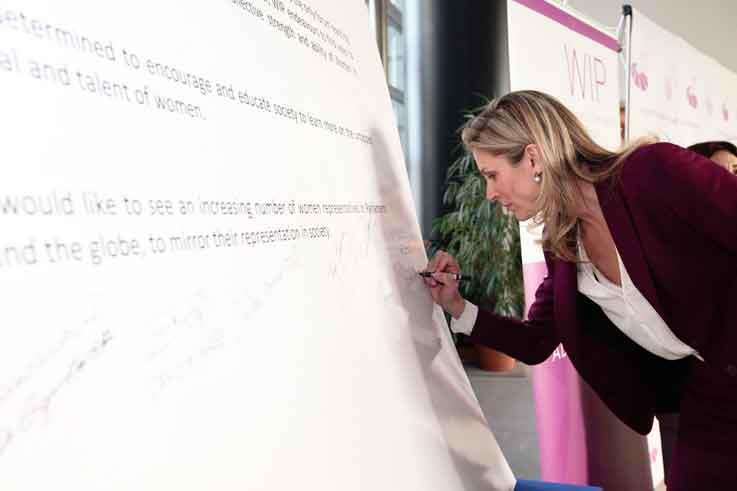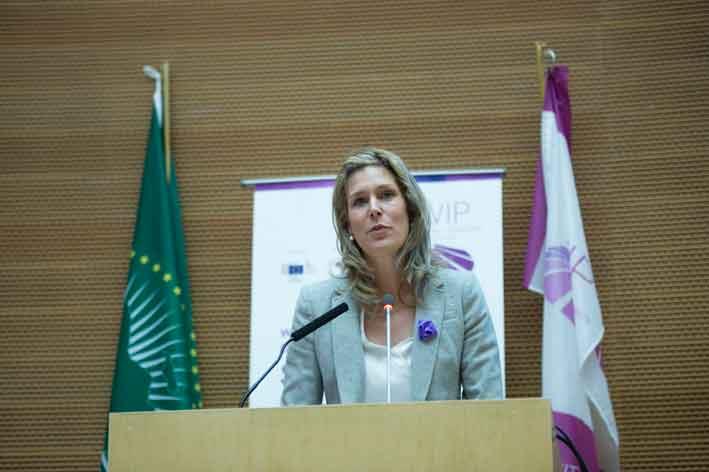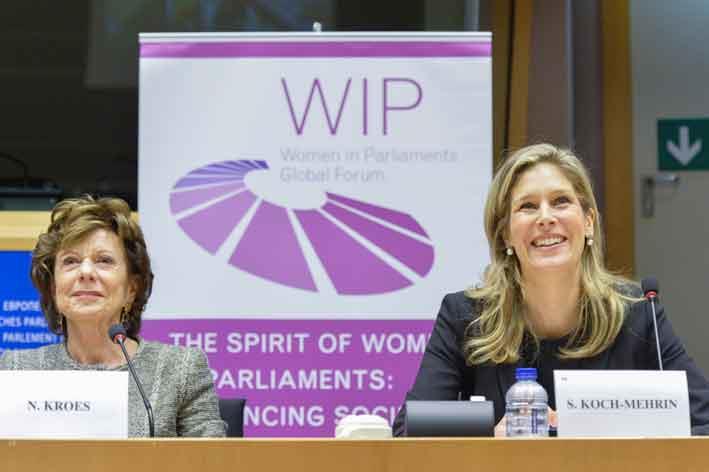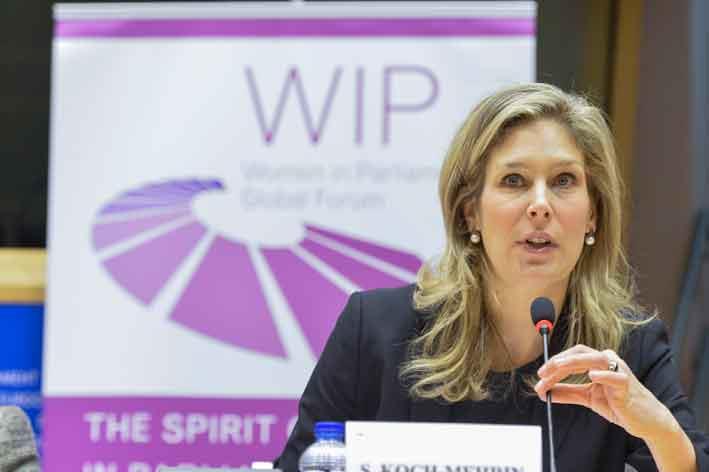“There are cracks for sure, but the glass ceiling (for women in top political positions) is still very much there," observes Silvana Koch-Mehrin. "There are very few countries in the world where there was a second woman elected or appointed to the post of Prime Minister or President. Many countries never had a female President or Prime Minister, and in most countries where there was, it was a one-off situation."
Silvana Koch-Mehrin, a former European Parliament vice president, was in Malta to take part in interactive workshops with girls on five campuses to encourage them to consider a career in politics and to think of their future leadership potential. She is working with the President’s Foundation of the Wellbeing of Society to sow the seeds of the exciting opportunities of political service, ahead of the Girl2Leader campaign being launched worldwide on 11 October – International Day of the Girl. President Marie-Louise Coleiro Preca is the patron and ambassador of the campaign.
Asked why in countries where a woman has been elected President or Prime Minister this was a one-off example in most cases, Koch-Mehrin gave the example of Hilary Clinton’s campaign during the last US election. “Many thought Clinton would win because of her experience. What she encountered in her campaign, as opposed to Trump, made many women very angry. I’m not too sure that this made other women want to be candidates, as there were so many personal attacks – and attacks on her because she is a woman – and clearly this made it very tough.” She also spoke of Angela Merkel’s early years in politics, “where the posters about her hairstyle, her hanging mouth – which have nothing to do with her ability to lead”, were seen.

“These are women of exceptional strength and many women ask themselves if they would want a life like that, but if there are more women in politics they can help give each other strength.”
Asked what she believes are the main issue that contribute to the low percentage of women in Parliament locally and internationally, Koch-Mehrin replied that it tends to be the same issues around the globe. “We conducted a study with Yale University and the London School of Economics on the non-legal barriers to women in politics. Apart from Saudi Arabia and Qatar, no country keeps women out of politics by law. The doors are open, so why is it that so few women go through those doors, or climb to higher positions? Globally, almost 80 per cent of parliamentarians are men, and 94 per cent of heads of state are men. There is a huge gender gap in these positions and it can be due to three phenomena.
“The first,” she said, “is monetary. It is harder for women to get funding for their campaigns and to access funds within political parties to support their activities. It’s the same in business: if a woman want to start a business, it’s more difficult for her to get a bank loan.
“An African MP summarised the issues in three M’s: money, men and media,” she quipped. “It’s about power, about a seat at the table, but you cannot always keep adding seats for more women coming in, someone needs to leave and if there is a majority and minority, it’s usually someone from the majority that has to leave. Most don’t necessarily do that voluntarily, because being in politics and having an influential position is attractive. So you are up against long-vested networks and traditional systems. Almost 130 years ago, the first country in the world gave women the right to vote, and the first ever elected female President is still alive, so it’s relatively new. Politics has been around forever, so is very much shaped and constructed in a way that the majority feel comfortable with.”

Asked whether she believes it is just a matter of time before things change and whether it isn’t something that can be rushed, Koch-Mehrin said: “It depends on how much time you want to have. I would love to see my grandchildren live in a world where they don’t think it makes any difference whether you are born male or female if your ambition is to become a Prime Minister. This is literally how much time it would take – and probably longer, if one does not try to speed things up. You can speed things up in different ways, and it’s not only about quota, it’s about affirmative action, campaigns like this one to motivate and inspire – it’s about communication and building networks.”
Turning to the media, she said that there is a conscious – or unconscious – bias towards women in leadership and how they are portrayed. It is normal that what is different from the mainstream is more interesting, she said. She compared the situation to trains and headlines in Germany: “If a train in Germany arrives late, it’s big news, yet only around 0.2 per cent of trains are delayed in Germany. As there are very few women in politics, they get a lot of attention but not necessarily positive attention. They are scrutinised more and receive a different type of scrutiny. Whether a man is divorced or married does not have an impact on his political qualities. Whether or not he stays at home to cook for his kids, he isn’t judged politically. But a woman is also usually assessed as a mother, a wife, and being feminine. This is time-consuming and with this sort of situation come questions regarding the place of the woman – whether a woman should have the freedom to choose between either being at home or being an aspiring political leader.”

Asked if there is unconscious discrimination from voters, whether voters are more likely to vote for a man than a woman and whether the perception of the traditional role of women plays a part in the low number of women succeeding in politics, Koch-Mehrin said: “It comes down to the question of the traditional place of men and women, and the choices that used to be open for men and women. For a long time, politics was for men and control over the house was for women. This has only changed over the past 130 or so years after women got the right to vote.
“It is relatively new”, she said, “and given that it is new, questions such as ‘are women able to lead a country in or out of conflict?’ ‘Are women able to juggle large budgets of billions and not just the private household budgets?’ ‘Are women capable of taking tough decisions?’ are asked.”
She pointed out that there are unconscious perceptions at play. As an example, she mentioned how Chile’s President was being questioned up until the point where a photograph of her in an army uniform looking quite tough changed that perception, adding “I’m not advocating that all women be like this.”
Asked whether such perceptions result in women not standing for political roles, she said “Certainly, because they are questioned on that decision immediately. ‘Do you think that you can be a good wife and be a politician? Have children and be a politician?’ No man is asked this; no man has to reflect on such questions. Women are questioned from the beginning and so that’s where women’s networks can be a big support, when it comes to answering such questions for oneself, as this is not about the woman as an individual, but about there still being the bias.”

This is how the Girl2Leader campaign can also help, she said, by introducing girls to women leaders. “You can’t be what you can’t see, but I also see a wonderful attitude in young girls who have this confidence to do whatever they want to do, and not let a glass ceiling hold them back.”
Asked about the Girl2Leader campaign, she said: “The aim is to get adolescent girls and young women interested in politics. Too often, politics is seen as a man’s job, and if you close your eyes and think of a political leader, the likelihood is that the image of a man will come to mind. So the aim is also to change views on politics, while inspiring girls to be ambitious for leadership roles, to be assertive and self-confident, to plant the grain of thought that politics could be something for them while opening up peoples’ eyes to the need for more women in politics.
“The campaign begins on 11 October, the International Day of the Girl. There are events in the European Parliament involving 10 MEPs from different countries, an event in Malta at which President Marie-Louise Coleiro Preca is taking the lead will be joined by a young female politician from Burkina Faso who holds political office in Belgium. Canada will also be holding an event in their Parliament. We will find an overlapping time, so that girls participating in the different countries can meet over Skype.
“We want to show that it is not just one country with this problem, but that it is a broader phenomenon,” she said, adding that the first step is to help girls become aware of the issues.
“After the 11th, the campaign will bring together female politicians and young girls. The idea behind this is that seeing women already in such roles is important, because they can see that they are human beings, that politics isn’t just for superwomen and that everyone can give it a try”, she explained.
“We also want to base the campaign on social media, as it forms a big part of the everyday reality of the younger age groups. We will involve Youtubers and, through cooperation with Google, will start off with three who each have international followings: one based in Iceland, one in France and the other in Germany.”
Asked whether she is in favour of positive discrimination, Koch-Mehrin replied that politics is full of positive discrimination and unofficial quotas. “In Malta, you cannot have a government solely from Gozo: you need a regional element that takes into account the different geographical perspectives. You probably wouldn’t have a government comprised of just people aged over 80, or just people with a medical degree, because diversity and opinions matter. So all this exists in politics, and I believe that adding the fact this diversity when it comes to gender is positive, because all of society should be included. So I think that affirmative action, given that politics is full of that already and it should not be a ground-breaking, man-discrimination element, should be there.”
Asked specifically about gender quotas, she said that her personal preference would be not to have quotas, but “if we want to see change happen, I think quotas as one element of different activities should be at least used as a credible threat, possibly even introduced. This needs to be differentiated. There are countries with quotas, but they don’t have any activity like a pipeline of personalities who bring in the interest and capability, just making it a numbers game which can be detrimental to the issue.”
Then there are countries – Mexico was a case in point for a long time – where there was a quota on paper where there would be a reserve person to replace the main candidate if he or she dropped out. “So the main candidate would fulfil the quota’s criteria, but the quota did not apply to the reserve candidates. What happened was that the main candidate would drop out after an election and the brother or husband who was the reserve got the job. It was a creative way of getting around the quota.
“If you are going to introduce quotas you must ensure that there are safeguards to ensure it is not abused, and that it is not an artificial numerical exercise. And also, women should not have to go through some qualification assessment, because men aren’t required to and we need a level playing field there as well.”